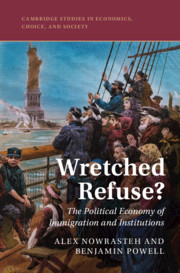Book contents
- Wretched Refuse?
- Cambridge Studies in Economics, Choice, and Society
- Wretched Refuse?
- Copyright page
- Contents
- Tables
- Figures
- Acknowledgments
- 1 Introduction
- Part I State of the Debate
- Part II Cross-country Evidence
- Part III Case Studies in Mass Immigration
- 9 United States
- 10 Israel
- 11 Jordan
- Part IV Assessing the New Economic Case for Immigration Restrictions
- Bibliography
- Index
11 - Jordan
from Part III - Case Studies in Mass Immigration
Published online by Cambridge University Press: 10 December 2020
- Wretched Refuse?
- Cambridge Studies in Economics, Choice, and Society
- Wretched Refuse?
- Copyright page
- Contents
- Tables
- Figures
- Acknowledgments
- 1 Introduction
- Part I State of the Debate
- Part II Cross-country Evidence
- Part III Case Studies in Mass Immigration
- 9 United States
- 10 Israel
- 11 Jordan
- Part IV Assessing the New Economic Case for Immigration Restrictions
- Bibliography
- Index
Summary
Saddam Hussein’s unexpected 1990 invasion of Kuwait forced 300, 000 Kuwaitis of Palestinian descent to flee into Jordan. By 1991, this large exogenous population shock increased Jordan’s population by about 10 percent. Jordanian law allowed these refugees to work, live, and vote in Jordan immediately upon entry. The refugees did not bring social capital that eroded Jordan’s institutions. On the contrary, we find that Jordan’s economic institutions substantially improved in the decade after the refugees arrived. Our empirical methodology employs difference‐in‐ differences and the synthetic control method, both of which indicate that the significant improvement in Jordanian economic institutions would not have happened to the same extent without the influx of refugees. Our case study indicates that the refugee surge was the main mechanism by which Jordan’s economic institutions improved over this time.
Keywords
- Type
- Chapter
- Information
- Wretched Refuse?The Political Economy of Immigration and Institutions, pp. 246 - 270Publisher: Cambridge University PressPrint publication year: 2020

